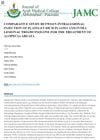10 citations,
January 2012 in “Case reports in medicine” Diphencyprone can cause unexpected and possibly permanent vitiligo.
3 citations,
April 2023 in “Dermatologica Sinica” PRP treatment may help with alopecia areata, especially in newer cases.
 2 citations,
April 2023 in “JEADV. Journal of the European Academy of Dermatology and Venereology/Journal of the European Academy of Dermatology and Venereology”
2 citations,
April 2023 in “JEADV. Journal of the European Academy of Dermatology and Venereology/Journal of the European Academy of Dermatology and Venereology” JAK-inhibitors for alopecia areata are generally safe with mostly mild side effects and a low rate of treatment withdrawal.
[object Object]  July 2024 in “Clinical Cosmetic and Investigational Dermatology”
July 2024 in “Clinical Cosmetic and Investigational Dermatology” Exosomes can help promote hair growth and may treat hair loss.
 June 2024 in “JEADV Clinical Practice”
June 2024 in “JEADV Clinical Practice” Severe alopecia areata patients have a low chance of spontaneous hair regrowth.

Betamethasone dipropionate lotion is more effective than minoxidil solution for treating Alopecia Areata.
 February 2024 in “Journal of Cosmetic Dermatology”
February 2024 in “Journal of Cosmetic Dermatology” Using a laser with bimatoprost solution works better for hair regrowth in alopecia areata than bimatoprost alone.
 January 2023 in “Journal of cosmetic dermatology”
January 2023 in “Journal of cosmetic dermatology” Fractional lasers effectively treat alopecia areata, especially when combined with minoxidil or cortisol.
March 2021 in “Annals of palliative medicine” Plum-blossom needling with conventional treatments improves hair regrowth in alopecia areata.
December 2022 in “International journal of research publications” Herbal medicine might be a good alternative for treating hair loss.
12 citations,
July 2016 in “Journal of dermatology” Intramuscular triamcinolone acetonide is an effective treatment for severe alopecia areata, especially in males.
10 citations,
June 2019 in “Dermatologic therapy” DPCP alone is more effective and safer for treating chronic extensive alopecia areata than combining it with anthralin.
 6 citations,
May 2023 in “Drugs”
6 citations,
May 2023 in “Drugs” Baricitinib helps regrow hair in adults with severe alopecia better than a placebo and is approved for treatment, but long-term effects are still unknown.
 3 citations,
June 2023 in “Journal of cosmetic dermatology”
3 citations,
June 2023 in “Journal of cosmetic dermatology” A new drug, abrocitinib, helped a child with severe hair loss regrow hair.
 1 citations,
December 2022 in “Journal of cosmetic dermatology”
1 citations,
December 2022 in “Journal of cosmetic dermatology” The combination of vitamin D analogues with potent steroids is a favorable treatment for alopecia areata with fewer side effects.
1 citations,
January 2017 in “International journal of trichology” Diphenylcyclopropenone (DPCP) effectively treated both alopecia areata and verruca vulgaris.
 October 2024 in “JEADV Clinical Practice”
October 2024 in “JEADV Clinical Practice” UK dermatologists commonly use corticosteroids and minoxidil to treat hair loss conditions.
 September 2024 in “Journal of Cosmetic Dermatology”
September 2024 in “Journal of Cosmetic Dermatology” Combining CGF and microneedling with betamethasone effectively treats resistant alopecia areata.

Baricitinib quickly improved severe alopecia areata, with almost total hair regrowth in three months.
January 2024 in “Acta dermato-venereologica”  August 2023 in “Medical Hypotheses”
August 2023 in “Medical Hypotheses” Metformin, usually used for diabetes, can also help treat hair loss from alopecia areata due to its ability to reduce inflammation and stimulate new hair growth.

Tofacitinib may effectively treat hair loss and improve symptoms in autoimmune conditions like alopecia areata and Sjögren's syndrome, but long-term treatment might be necessary.
 January 2023 in “Journal of The American Academy of Dermatology”
January 2023 in “Journal of The American Academy of Dermatology” Baricitinib helped most teenagers with severe hair loss regrow hair and had mild side effects.
 September 2022 in “Journal of Ayub Medical College Abbottabad”
September 2022 in “Journal of Ayub Medical College Abbottabad” Steroid injections are more effective than platelet rich plasma for treating patchy hair loss.
[object Object] September 2016 in “한국임상약학회지” Ibuprofen, menthol, and cetirizine may help prevent or slow hair loss.
 July 2012 in “Faculty Opinions – Post-Publication Peer Review of the Biomedical Literature”
July 2012 in “Faculty Opinions – Post-Publication Peer Review of the Biomedical Literature” New treatment with Wnt proteins and growth factors safely increases hair thickness.
9 citations,
January 2013 in “International journal of trichology” 88% phenol is effective for treating alopecia areata.
 2 citations,
July 2023 in “Journal of dermatology”
2 citations,
July 2023 in “Journal of dermatology” Alopecia areata causes a significant economic burden in Japan, mainly due to productivity loss.
67 citations,
July 2011 in “Clinical, cosmetic and investigational dermatology” The document suggests a personalized treatment plan for alopecia areata based on the patient's age and hair loss severity, using a range of therapies ranked by effectiveness and safety.
61 citations,
September 2010 in “Journal of Dermatological Science” Stress hormones and autoimmune reactions can cause hair loss.

















